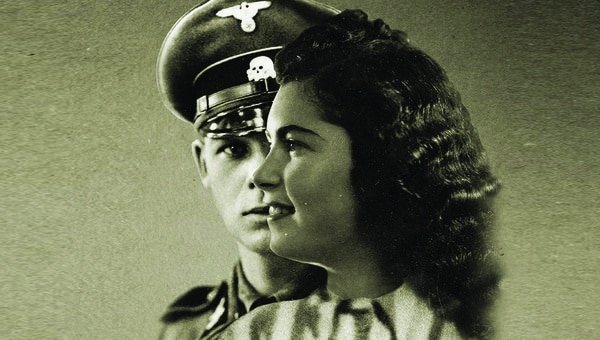





Dir.: Maya Sarfaty; Documentary with Helena Citron, Roza Citron, Frank Wunsch; Israel/Austria 2020, 86 min.
Israeli writer/director Maya Sarfaty builds on her award-winning graduation short film The Most Beautiful Woman (2016) with this ‘impossible love’ story that took place in Auschwitz-Birkenau between Helena Citron, a Slovakian Jew, and one of her captors, Viennese SS Unterscharführer (Sergeant) Franz Wunsch. Although the title suggests otherwise, witness reports from seven close female camp survivors claim ‘he loved her to the point of madness”.
And somehow Sarfaty helps, however involuntarily, to cement this statement. True, Wunsch, born in 1922 like Helena, was a sadist who beat male prisoners to death and helped at the infamous ‘Rampen’ selections. But he also risked his life to save Helena and her sister Roza (1932-2005) from certain death, literally storming into the corridor leading to the infamous “Shower Rooms” to free Roza, although he could not save her two children, much to Helena’s chagrin.
Helena and Roza were amongst several thousand Slovakian Jews deported to Auschwitz-Birkenau in 1942, before the Death Camp was fully functioning. The women helped with the demolition of older buildings and many were killed during the TNT explosions, where they were literally at the ‘coal face’. “We had become animals, ready to push our best friends to the front, just to survive ourselves”.
Helena first met Franz Wunsch on his birthday when he asked the women prisoners to sing a song in his honour. Helena chose the titular German hit song “Liebe war es nie” (Love it was Not) and Franz politely asked her for an encore. This was the beginning. Soon afterwards Helena caught typhoid, which was usually fatal, but Wunsch instructed the camp medics to look after her, and she recovered.
In an interview in 2003, Wunsch shares his memories of Dr. Josef Mengele who warned him “we are all going to be persecuted’ and promised not to denounce Wunsch, who had been wounded at the front and walked with a limp before being assigned to guard duty in Auschwitz. He found himself in active service again after the camp internees were sent on a death march. Helena and Roza were amongst the few who survived.
After the end of WWII Wunsch tried to pursue the relationship, but his letters were ignored and eventually he gave up. In 1972, Helena, who had emigrated to Tel Aviv in Israel, got a letter from Wunsch’s wife, pleading her to come to Vienna, where her husband was on trial for murder. “I know the two of you had been close, and I want you tell the court about it”. Under pressure to stay put, Helena still made the journey to Vienna and told the court about Wunsch’s crimes, but also how he saved her sister’s life. Wunsch was acquitted, the jury members, in an interview, claimed to have been on his side. “It was difficult in Austria to get a guilty-verdict in cases of concentration camp guards” said the state prosecutor of the Wunsch inquiry, very much resigned to the fact.
Wunsch’s daughter Dagmar also has her say, indignant that her father wore a medallion with two only photos: that of Helena and himself. “It should have been Mutti’s photo” says Dagmar, visibly upset. Bizarrely Franz Wunsch cut Helena’s face out of one of the photos, and superimposed it onto that of another woman, adding himself into the collage to make out they were just ordinary lovers in real life.
Artists Shlomit Goper and Ayelet Albeuda assemble a multilevel 3D photo montage together with the cuttings of Wunsch superimposed on the reality of the death camp. DoPs Itay Gross and Ziv Berkovich have taken great care filming the survivors, two of them having died before the feature was released. Helena Citron died in 2007, Franz Wunsch two years later. Their relationship in the hell of Auschwitz was a sort of ‘follie a deux’, unimaginable in the real world, rather like the death camps themselves. AS
FROM 26-28 January 2022 | JW3 Cinema LONDON NW3 | HOLOCAUST MEMORIAL DAY